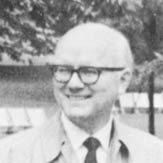William Shannon
- 1969

Fellowship Title:
- Comparative Study of English Political Institutions
Fellowship Year:
- 1969
A Letter from Brighton – II: Conservatives
“Britain would be better off with the Conservatives” proclaimed the single, huge banner stretched across the wall above the platform in Brighton’s Top Rank Centre, as Conservatives gathered on October 8 for their annual party conference. In addition to the new banner and a helpful screen in one corner telling the delegates the number of the resolution under debate and the name of the speaker, the Conservatives had also rearranged the chairs on the floor to enlarge the seating because many more people attended their conference—about 4,500 — than do that of Labor—upwards of 2,000. The increase is mainly made up of women. Working class and trade union wives leave politics to their menfolk, but in middle and upper class Conservative families, the women have the time and the inclination to do party work. Moreover, as at American political conventions, many Conservatives bring their wives and make their annual conference as much a social as a political function. The contrast in atmosphere with the preceding week could not have been sharper. Bowler hats and mink
A Letter from Brighton – I: Liberals and Labor
Part One: The Liberal Party Conference If King George IV had not built the Royal Pavilion, Brighton would be just a pleasant, undistinguished seaside resort. If the Liberal Party did not persevere despite nearly fifty years of political adversity, the British people would have a two-party system, which conforms even more than it already does to divisions of class and status. But the Pavilion, a small palace built in a vaguely Oriental style with onion-shaped domes and slender towers, provides a romantic, exotic character to Brighton. Similarly, the Liberals provide British politics with a dash of unpredictable independence, of quixotic idealism, which enlivens the scene and occasionally embarrasses the conventional power-seekers in the Labor and Conservative parties. The Liberals opened the fall political season with their annual conference in Brighton from September 17 through 20. Labor followed from September 29 through October 2, and the Conservatives wound things up a week later. As in America, these proceedings are televised to the point of boredom for many viewers and probably beyond the point of any
Post-Imperial England in Transition
In the past twenty-five years, Britain has lost an empire and dropped from a world super-power to one of a half dozen medium-rank powers. What does such a decline do to a nation’s political and social institutions? What follows is the first of a series of reports, which attempts to examine this question. An American arriving in London in the same week as the astronauts landed on the moon has a unique opportunity to understand Britain’s changed status in the world. Americans have become accustomed to thinking of their country as the foremost power in the world. It seems only natural that the first men to land on the moon should be Americans, that we have never lost a war, and that if an American ship or plane is attacked, it is cause for political uproar and congressional investigation. Every Englishman (“English” and “British” are used interchangeably in these reports although it is understood that Britain comprises Scotland, Wales, and Northern Ireland as well as England.) over forty grew up with the same natural sense
